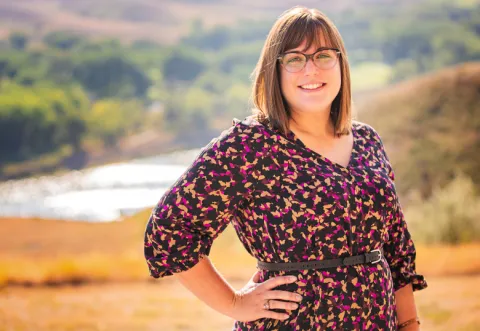Young Alumni Award recipient, Dr. Amy Mack, a key voice in advancing global human rights
Committed to equity, the work of reconciliation and the promotion of democracy, as well as the mentorship of young people, Dr. Amy Mack has made an indelible impression on communities both near and far. The University of Lethbridge Alumni Association (ULAA) has named Mack the 2023 Young Alumnus of the Year.

“In a short time, Dr. Amy Mack has proven herself as an outstanding academic researcher and engaged global citizen,” says Deirdre McKenna (BA ’94), ULAA president. “Dr. Mack has helped us understand the troubling rise of extremism and how social media has fueled the phenomenon. Her passion for research and facilitating dialogue helps communities understand these challenging topics and the questions they raise about our world.”
Mack will be presented with her award at the Let There Be Light Night Alumni Association Awardscelebration on Thursday, Oct. 12, 2023, beginning at 7 p.m. in Science Commons. Tickets for the event are available online.
Dr. Amy C. Mack (BA ’13, MA ’16)
Mack excelled as an undergraduate anthropology student at the University of Lethbridge, showcasing her skills as an excellent citizen-scholar, skilled researcher, analyst and collaborator, and stellar student. She established an early record of funding and academic publication and undauntedly explored polarizing topics. As a board member for Amnesty International Lethbridge, she organized events and fundraisers to bring attention to local and global human rights issues.
Mack’s master’s studies focused on studying male-dominated online video game communities. This research occurred at the time of Gamergate, an online harassment campaign targeting women in the video game industry. She remained resolute in addressing gender issues in the face of trolling and aggression and developed a broader interest in how social media and other digital technologies impact social and political landscapes.
After completing her master’s, Mack was the lead researcher and project manager on the Raising Spirit project, a collaboration with the Opokaa’sin Early Intervention Society, a non-profit dedicated to Indigenous children and families in southern Alberta. She helped build a digital storytelling library with a team of Indigenous and settler high school and undergraduate students and built strong relationships with local communities in the process. Her long-lasting ties to Blackfoot Elders and community members exemplify what it means to work toward reconciliation.
Mack’s doctoral research at the University of Alberta focused on the rise of online hate and extremism. She’s committed to public engagement around these contentious issues and was recently involved with CIVIX, a non-partisan national charity building the capacity and commitment of young Canadians to participate in democracy. She also works with schools on developing curricular materials that can interrupt the radicalization of young people.
Following the 2022 protests in Ottawa and at the Alberta-Montana border, she saw a need for rural communities to have more resources to address radicalization. In response, Mack, along with an international group of early-career scholars, founded the Canadian Institute of Far-Right Studies (CIFR), a think tank dedicated to the critical study of the far right in Canada.
Mack has been funded for two years as a post-doctoral fellow at the Center for Research on Extremism in Oslo, Norway following the completion of her post-doctoral work at UAlberta. Originally from Claresholm, her academic and professional work has taken her across Canada and Europe where she speaks to government, industry professionals and academics.
To view online: https://www.ulethbridge.ca/unews/article/young-alumnus-year-dr-amy-mack-key-voice-advancing-global-human-rights
-- 30 --
Contact:
Trevor Kenney, News & Information Manager
403-329-2710
403-360-7639 (cell)
@ULethbridge
Our University’s Blackfoot name is Iniskim, meaning Sacred Buffalo Stone. The University is located in traditional Blackfoot Confederacy territory. We honour the Blackfoot people and their traditional ways of knowing in caring for this land, as well as all Indigenous Peoples who have helped shape and continue to strengthen our University community.
